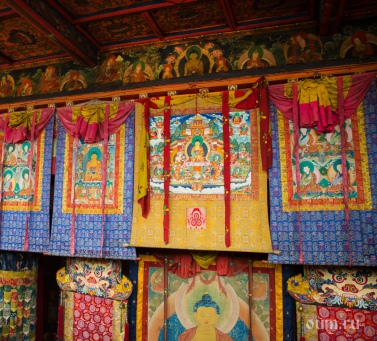
"I, too, brahman, plow & sow. Having plowed & sown, I eat."
"But, contemplative, I don't see the Master Gotama's yoke or plow, plowshare, goad, or oxen, and yet the Master Gotama says this: 'I, too, brahman, plow & sow. Having plowed & sown, I eat.'"
Then the Kasi Bharadvaja addressed the Blessed One with a verse:
You claim to be a plowman,
but I don't see your plowing.
Being asked, tell us about your plowing
so that we may know your plowing.
[The Buddha:]
Conviction is my seed,
austerity my rain,
discernment my yoke & plow,
conscience my pole,
mind my yoke-tie,
mindfulness my plowshare & goad.
Guarded in body,
guarded in speech,
restrained in terms of belly & food,
I make truth a weeding-hook,
and composure my unyoking.
Persistence, my beast of burden,
bearing me toward rest from the yoke,
takes me, without turning back,
to where, having gone,
one doesn't grieve.
That's how my plowing is plowed.
It has
as its fruit
the deathless.
Having plowed this plowing
one is unyoked
from all suffering
& stress.
Then Kasi Bharadvaja, having heaped up milk-rice in a large bronze serving bowl, offered it to the Blessed One, [saying,] "May Master Gotama eat [this] milk-rice. The master is a plowman, for the Master Gotama plows the plowing that has as its fruit the deathless."
What's been chanted over with verses
shouldn't be eaten by me.
That's not the nature, brahman,
of one who's seen rightly.
What's been chanted over with verses
Awakened Ones reject.
That being their nature, brahman,
this is their way of life.
Serve with other food & drink
a fully-perfected great seer,
his fermentations ended,
his anxiety stilled,
for that is the field
for one looking for merit.
"Then to whom, Master Gotama, should I give this milk-rice?"
"Brahman, I don't see that person in this world — with its devas, Maras, & Brahmas, in this generation with its royalty & common people — by whom this milk-rice, having been eaten, would be rightly digested, aside from a Tathagata or a Tathagata's disciple. In that case, brahman, throw the milk-rice away in a place without vegetation, or dump it in water with no living beings."
So Kasi Bharadvaja dumped the milk-rice in water with no living beings. And the milk-rice, when dropped in the water, hissed & sizzled, seethed & steamed. Just as an iron ball heated all day, when tossed in the water, hisses & sizzles, seethes & steams, in the same way the milk-rice, when dropped in the water, hissed & sizzled, seethed & steamed.
Then Kasi Bharadvaja — in awe, his hair standing on end — went to the Blessed One and, on arrival, throwing himself down with his head at the Blessed One's feet, said to him, "Magnificent, Master Gotama! Magnificent! Just as if he were to place upright what was overturned, to reveal what was hidden, to show the way to one who was lost, or to carry a lamp into the dark so that those with eyes could see forms, in the same way has Master Gotama — through many lines of reasoning — made the Dhamma clear. I go to Master Gotama for refuge, to the Dhamma, and to the Community of monks. May Master Gotama remember me as a lay follower who has gone to him for refuge, from this day forward, for life. Let me obtain the going forth in Master Gotama's presence, let me obtain admission."
Then the brahman Kasi Bharadvaja obtained the going forth in the Blessed One's presence, he obtained admission. And not long after his admission — dwelling alone, secluded, heedful, ardent, & resolute — he in no long time reached & remained in the supreme goal of the celibate life, for which clansmen rightly go forth from home into homelessness, knowing & realizing it for himself in the here & now. He knew: "Birth is ended, the celibate life fulfilled, the task done. There is nothing further for the sake of this world." And so Ven. Bharadvaja became another one of the arahants.